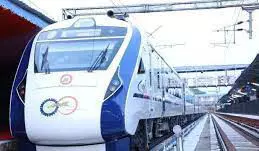
Railway development beyond 'Vande Bharat'
text_fieldsThe Vande Bharat train has been the topic of conversations and news since it began its services in Kerala. It is only natural that discussions would take place around the new experiences of relatively comfortable medium-distance travel. Keralites are understandably fascinated and delighted by the fact that such trains are now available that are different from the current ones in a state of deterioration. And with the presence of Prime Minister Narendra Modi to flag off the Vande Bharat, the celebratory atmosphere and excitement that has not been seen before during an inaugural service of a train, 'Vande Bharat' claimed unusual attention. Even after the first excitement of booking a journey, travelling on "Vande Bharat" would be a novel experience due to its punctuality, cleanliness, and upkeep of its coaches and restrooms.
Apart from the zeal of politicians, there are some admirable facts behind this new train service. Launched in 2018 under the name Train-18, this train is the result of dedicated technical work right from its design. While it normally takes 36 months for the completion of a train- from the drawing board to hitting the track, the Integral Coach Factory (ICF) took just 18 months to complete this train. Train-18 was renamed 'Vande Bharat' before it started running. Although it was claimed that the name indicated the indigenous construction, the Central Government must have had a reason for naming it that way since it takes special delight and elation in naming and renaming things. Needless to say, since the first Vande Bharat started running on the Delhi-Varanasi track in 2018, the Prime Minister himself has been flagging off Vande Bharat trains for more political reasons rather than developmental considerations. In 2016, Sudhanshu Mani, former General Manager of ICF for a brief stint who played a crucial role in the Train-18 project, has written a book titled 'My Train-18 Story', describing the remarkable experiences and challenges in bringing out the train as what it is now. He has said in interviews and speeches that this achievement is not just his, but also his team's. The handbook of Train-18 released by the Ministry of Railways in 2018 also describes technical innovations and improvements. Certainly 'Vande Bharat' is an achievement that Indian Railways can be proud of.
However, the developmental plans of the Indian Railways should not be limited to putting a slightly cleaner, more cute train on the tracks. In the 170 years since British introduction of railway, how revolutionary were the achievements of the railways compared to other modes of transport? It is doubtful whether there has been any remarkable improvement in the number or quality of railway tracks or the quality of trains in recent history. It is true that after the rail budget became part of the general budget in 2016-17, the annual budget for the railways increased from Rs 1.09 lakh crore to Rs 2.60 lakh crore in 2023-24. But this is only the expense part. K. Balakesari, a former official member of the Railway Board, has pointed out in an article with figures that there has not been enough progress in the transportation of goods and quality of passenger services. For example, while aiming to increase the country's total goods traffic from 27 per cent to 45 per cent by 2050, this traffic has declined from 51.5 per cent in 2008-09 to 31.4 per cent in 2018-19. Vande Bharat itself has a speed limit. The main reason for this is that the tracks remain without radical change and with limitations.. Most of the sections have curves or other speed restricting debilities. Although the speed of the train is 160 km per hour, it can only have a speed of 80 and 110 km per hour on such tracks. On the passenger trains side, there are flaws in the standards of punctuality itself. Time-keeping at intermediate stations does not matter in the current system where punctuality is calculated only by the time of arrival at the final destination. Even if it does not reach standards of developed countries, if 90 per cent of the time the trains arrive within five minutes of the scheduled time, it can still be considered as progress. But more important than this is the dismal quality of coaches. There should be an effort on the part of the administration to recognize that the progress of the Indian Railways does not come from running a few more 'Vande Bharat' trains that are only useful to a small percentage. The government needs to derive a comprehensive development method to ensure that there are more trains that do not have stagnant water in the toilets or defective watertaps.


























